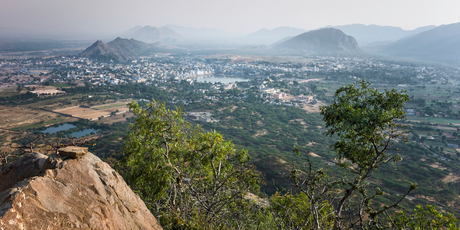By Suzanne Middleton
Marwari horses steal Suzanne Middleton’s heart at the start of a three-month journey through Rajasthan in Northern India.

Pushkar, the Aravalli Hills, Rajasthan. Photo / Thinkstock
The Pushkar Camel Fair is a glorious melee of camels, farmers and tourists both Indian and foreign. Reminiscent of a New Zealand A&P show back in the 1960s, it's a farmers' big day out spread over nine days of competitions, displays, horse trading and religious observance.
To the urban tourist it's a spectacle of colour and fast-moving beasts. But for the horse lover it's a paradise of voluptuous horseflesh. In a sea of beige camels and cattle the vibrant Marwari horses, white, grey, black, bay and skewbald, snatch my attention from day one. Brought here to be sold, they're presented at their best, proud and noble animals bred by tough desert men.
These fiery and feisty horses are dynamite and they seem to know the place they hold in the hearts of Rajasthanis. They're a 2000-year-old breed, used as cavalry horses and ridden by the maharajahs of old, known for their courage, strength and endurance.
Striking in appearance, they're lean with clean lines, between 14.2 and 15.2 hands high, and any colour except chestnut. Their numbers were reduced to a few hundred 20 years ago, but now the Rajasthani government is encouraging excellence in the breed.
The men put the horses through their paces in the arena, leaning back with their feet forward, travelling at a thundering trot or a blistering semi pace, as smooth as the sand at their feet.
Prospective buyers observe, question, argue and bargain.
Away from the arena they've set up camp with tents, campfires and utes, the horses close by. Tethered with ropes on both hind fetlocks plus tied by a neck strap or halter as well, the horses are remarkably calm and settled, munching high-protein green feed and local grass off the ground and in nosebags while their owners cook chapattis on a fire, sleep or chat nearby.
Too much horsey information? One more fact for the horse obsessed reader then I'll move on. The unique feature of the Marwari horse is its exquisite ear tips which curve inwards and almost touch, a shape which is compared to a scimitar or the curled moustache of a Rajasthani man.
If you're an experienced rider you can ride a Marwari horse on a trek through the desert for a few days. The Royal Equestrian and Polo Centre at Dunlod can arrange this for you. Or you might get lucky at Pushkar. We saw a young woman tourist take one of the horses for a spin, much to the amusement and consternation of the local men. Her verdict? It was an incredibly smooth ride.
If horses don't set your hormones racing, try a camel ride, watch the tiny Gypsy gymnasts tightrope walking, see the decorated camel contest, or the elegant young girls performing traditional dances in their brilliantly coloured costumes. Or wander away from the arena to where the camel owners set up camp under their carts and you might see them primping their camels with paint and clippers.
Like all good A&P shows it's a time for everyone to dress in their finery and meet up with friends. Groups of women in traditional outfits of red, yellow and pink with flashing gold decoration, often with their headdress covering their faces, move through the arena and into the narrow streets of Pushkar in search of bargains and gold jewellery.
Their men do the same, dressed in orange turbans, long cream shirts, white wrap around dhotis, camel leather shoes with curled up toes and tiny gold earrings. They are the very essence of self containment as they saunter through town in twos and threes, tuning out the bustling locals and gawping tourists. The town's tailors are busy as new clothes are run up for the farmer who's sold a horse or camel, while the cafes are full of visitors drinking chai or coffee and eating thalis, wraps or pizzas. Samosas move fast out on the street.
It's November and we're seeing Pushkar at its most crowded and chaotic but the weather is perfect for us with the temperature in the 20s during the day and colder at night. It's the Hindu lunar month of Kartika with the full moon signalling the end of the festival and thousands of pilgrims from all over India visiting to bathe in the sacred waters of Pushkar Lake.
If it's the horses and camels you're interested in, come early, but if you're keen to experience the traditional pilgrimage side of Pushkar, time your visit closer to the full moon.
For us the most unforgettable moments happen away from the crowds and organized events. An old sadhu buys a bag of tomatoes then sits down to toss them one by one to a pack of stray dogs which wolf them down. This is a strictly vegetarian town. Our meal at a peaceful lakeside restaurant is interrupted with a bang and a clatter as a bunch of monkeys appears from nowhere and scuttles across the roof and up a tree, creating a great kerfuffle and with the yelling waiter in pursuit.
Eventually everyone packs up their tents and animals and heads home richer, poorer, winner, loser or just spectator, and as we get on bus leaving town I wish I'd had the guts to snatch a kiss from that beautiful grey Marwari horse when no-one was looking. Then I'd remember her smell as well as her beauty.
By Suzanne Middleton

No comments:
Post a Comment